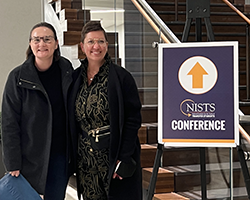
From Research to Practice: Holistic Credit Mobility Ensures Learning Counts

Ithaka Senior Researcher Sarah Pingel and Ascendium Senior Program Officer Carolynn Lee at the National Institute for the Study of Transfer Students convening
Learners today are increasingly likely to accumulate job-relevant skills across a range of formal and informal educational experiences. Not only do many learners move between postsecondary institutions, but they may also acquire learning in non-credit and work-based training, dual enrollment in college programs while still in high school, military service and in many other settings. But our systems have not caught up to these trends in how learners navigate a complex set of postsecondary learning options. For learners to be able to communicate their skills to potential employers, that learning has to be validated and applied to a credential.
Postsecondary institutions often don't have the policies or practices in place that allow them to efficiently assess and accept diverse forms of prior learning. For example, students lose an estimated 43% of prior credit when they move from one institution to another, according to the Government Accountability Office, and this takes only transfer into consideration — just one segment of prior learning experiences. Large-scale credit loss like this disproportionately impacts learners from low-income backgrounds. These individuals often gain work experience before going to college or start at a less expensive two-year institution with the goal of transferring to a four-year institution for their bachelor’s degree. In many cases, such learners simply give up on their goals. For example, the Community College Research Center reports that over 80% of community college students intend to transfer to earn a bachelor’s degree, but only an estimated 13% succeed.
Ithaka S+R is addressing this credit loss with its holistic credit mobility framework. The framework considers the policy and practice levers that would have to be realigned for institutions to better assess and apply all forms of prior learning. The most important factor is the learning outcome, not where the learning occurred. Ascendium Senior Program Officer Carolynn Lee tells us, “Important work on credit articulation, equivalency, and prior learning assessment happens in many corners of a postsecondary institution. This framework represents a holistic vision of approaching policy, practice and technology that represents a more fully integrated system of learner mobility.”
This framework can inform the field and push others to consider more and different sources of validated prior learning, ultimately creating new pathways to help students meet their goals. Ithaka, for example, is enhancing its Transfer Explorer tool to include validated learning from work experience, dual enrollment and beyond. The Transfer Explorer tool was designed in partnership with the City University of New York system to support the transfer of credits between two-year and four-year institutions. In addition to enhancing the tool, it will also be replicated in at least one more state, showing its value as a model for those outside of New York to follow.
Ascendium’s grantmaking prioritizes systemic approaches to addressing credit and learner mobility and the use of technology to complement policy and practice. Our partnership with Ithaka S+R is an important part of this ongoing effort to support innovative solutions. Carolynn Lee co-presented on the holistic credit mobility framework with Ithaka Senior Researcher Sarah Pingel at the National Institute for the Study of Transfer Students annual conference in Portland, Oregon in February this year. Participant discussion highlighted the importance of organizing and integrating institutional policies, practices and tools so that all validated learning experiences count. The holistic credit mobility framework is pushing this agenda forward to help all learners, especially those from low-income backgrounds, reach their education and career goals.


